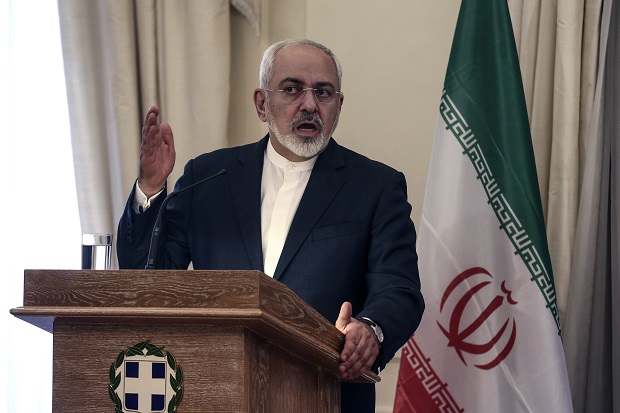
Iranian Foreign Minister Mohammad Javad Zarif addresses journalists during a news briefing in Athens, Greece, on Thursday, May 28, 2015. Iran’s foreign minister is holding out hope that a “sustainable, mutually respectful” deal can be struck with world powers in talks over his country’s nuclear program. AP
VIENNA, Austria – Global powers and Iran hit the final straights of marathon talks Saturday, amid signs some of the toughest hurdles blocking a deal to curb the Iranian nuclear program may have been resolved.
After a 13-year standoff which has poisoned Iran’s international relations, the UN atomic watchdog voiced hopes of a breakthrough to complete a stalled probe into whether Tehran sought to develop nuclear arms in the past.
And on complicated moves to ease a web of sanctions, there were indications that at least at the level of experts some understanding may have been thrashed out, although discussions continued as a new Tuesday deadline looms.
The so-called P5+1 — Britain, China, France, Germany, Russia and the United States — are trying to draw the curtain on almost two years of roller-coaster negotiations since the election of President Hassan Rouhani in 2013.
The aim is to finalize a deal which would put a nuclear bomb beyond Iran’s reach, in return for lifting biting international sanctions slapped on the Islamic republic.
IAEA chief Yukiya Amano told reporters after a whirlwind visit to Tehran that progress had been made as the International Atomic Energy Agency (IAEA) seeks to ensure that any deal is “technically sound.”
“With the cooperation from Iran, I think we can issue a report by the end of the year on the… clarification of the issues related to possible military dimensions,” Amano told reporters after his talks in Tehran earlier this week.
Iran has long denied it has sought to develop a nuclear bomb and has so far refused UN inspectors access to sensitive military sites to verify its claims.
The standoff has stalled an IAEA probe into the allegations that before 2003, and possibly since, Iran conducted research work into developing nuclear weapons.
US Energy Secretary Ernest Moniz and Iran’s nuclear chief, Ali Akbar Salehi, were back at the negotiating table early Saturday seeking to finalize the deal.
Meanwhile, it also seemed there had been some agreement at expert level on how to ease a web of UN, EU, and US sanctions.
A Western official told AFP that a deal “was possible” on the US sanctions “but there is no agreement yet on the UN” embargoes.
A senior US administration official said: “Even if and when issues get resolved at an experts’ level, there will remain some open issues that can only be decided by ministers.”
Abbas Araghchi, Iran’s lead negotiator, told Iranian TV late Saturday that there were still “four or five” outstanding questions regarding sanctions, including synchronizing their lifting with actions by Tehran.
As hopes grew for a deal, French Foreign Minister Laurent Fabius and Germany’s Frank-Walter Steinmeier were expected back in Vienna on Sunday.
It was not immediately clear when their counterparts from Britain, Russia and China or EU foreign policy chief Federica Mogherini might also return.
Iranian Foreign Minister Mohammad Javad Zarif, who held a second meeting late Saturday with US Secretary of State John Kerry, said the world had “never been closer” to a deal.
In a rare move, he also offered the promise of greater cooperation to tackle other global problems, such as the rise of the Islamic State group, should the deal be sealed.
Iran was ready to strike “a balanced and good deal,” Zarif said in an English message posted on YouTube, which could “open new horizons to address important common challenges”.
Russian diplomats have said the complex accord, which will stretch to at least 20 pages with a slew of technical annexes, is “90%” written.
After missing several deadlines, the so-called P5+1 group has now given themselves until Tuesday to conclude the deal.
“Extending the talks is not an option for anyone… We are trying to finish the job. Whether we can manage it I can’t say with certainty,” Araghchi said.
“If we reach an agreement that respects our red lines then there will be a deal. Otherwise we prefer to return home to Tehran empty-handed.”
The impending deal prompted Israel on Saturday to reiterate its opposition to the lifting of sanctions against Iran.
“From the moment the sanctions are lifted, tens or even hundreds of billions of dollars will flow into the Iranian economy, something that cannot be reversed,” the office of Prime Minister Benjamin Netanyahu said in a statement, calling Iran “the most dangerous country in the world”.
Netanyahu has repeatedly said the deal being forged with world powers could leave Iran with the ability to develop nuclear weapons, and he has not ruled out the use of military force to prevent it.

